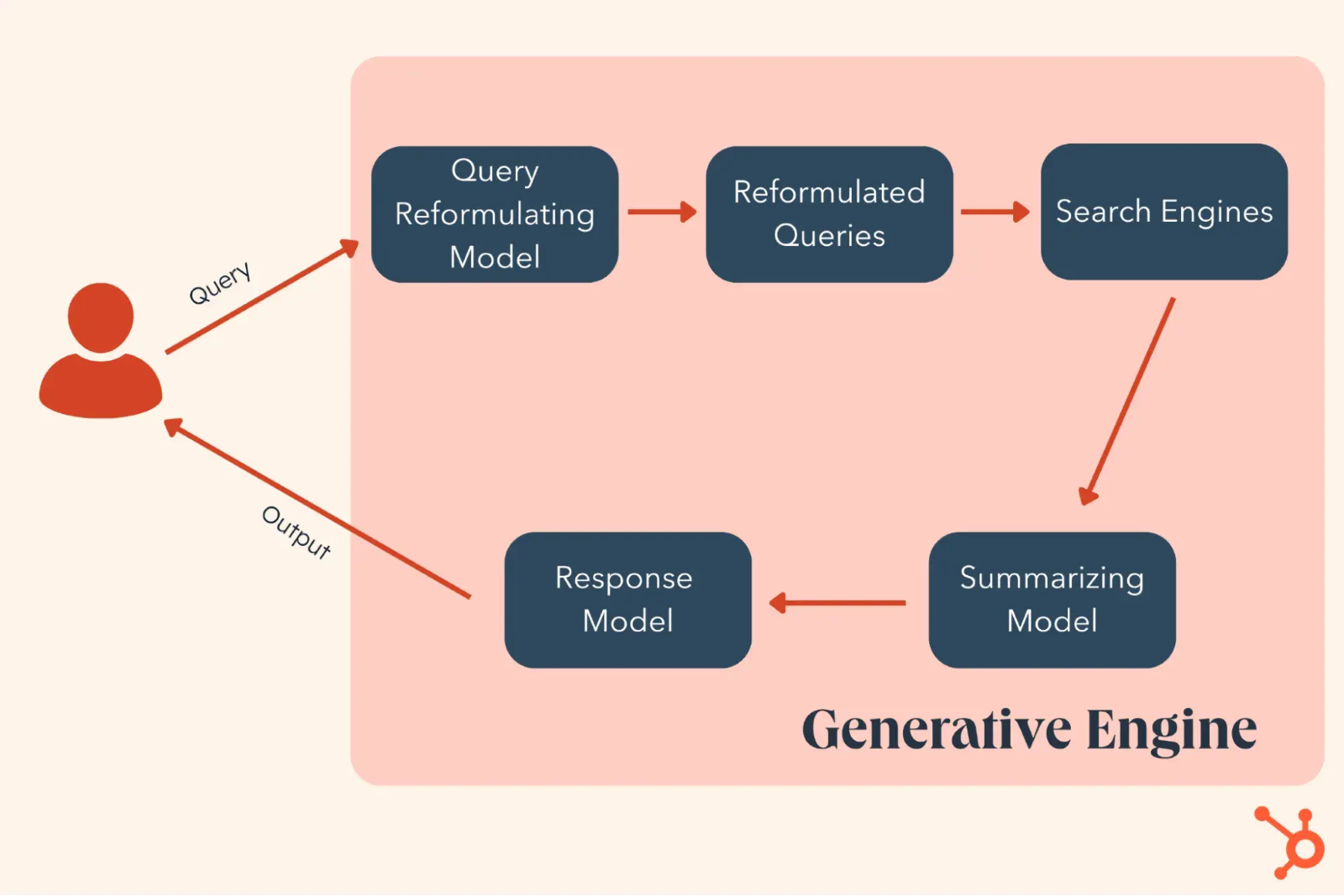Executive Summary
As generative AI search engines like ChatGPT transform the digital landscape, B2B marketers must evolve their strategies to stay competitive. Given the fact that 83% of companies are planning to increase investment in AI in the future, it is important for marketers to understand the advanced tools effectively.
As opposed to traditional keyword-based initiatives, AI search models aim for user intent and context. The transition from traditional SEO to GEO reveals a recent trend in AI search where location-based, target segment rankings play a significant role.
Introduction
Technological advancements that involve the use of AI have transformed the way firms interact with their customers, especially in B2B marketing. Traditional methods of search occur at risk as AI provides better search options with increased precision and relevance.
A survey conducted in 2024 in the United States revealed that 25% of the respondents who interacted with AI-enhanced search engines were able to find results that were more relevant to what they wanted, and 12 % were more trustworthy results compared to traditional search engines.
This shift demonstrates the increasing trust of marketers in AI, as more than 50.6% of marketers report positive attitudes regarding the increased adoption and implementation of AI-driven technologies into their strategies.
Methodology
In today’s fast-paced digital environment, B2B companies are navigating an exciting new landscape: AI-driven search.
“SEO to GEO: Mastering Generative AI Search Rankings for B2B” is an innovative seminar presented at the B2B expo 2024 in LA designed to equip participants with the necessary tools to succeed in this emerging era of online presence, grounded in extensive research.
We did a systematic study on over 5,000 B2B firms (ranging from $5 million to $500 million in revenue annually) in the US West Coast, evaluating their performance in AI-produced top 10 rankings with respect to niches and states.
We initially screened a total sample of 5,142 B2B firms for basic business criteria, then refined it down to 2,700 firms by location/micro-niche. This led us to narrow down the data to 200 micro-niches, which provided us with a better understanding of the basic ranking factors employed by generative AI.
Using prompts like “List the top 10 <niche> companies in <state>” with Gemini and ChatGPT, we discovered over 40 factors that define these AI-generated rankings.
Among the key factors we examined were:
- Total Backlinks: The number of backlinks that add up to credibility and authority.
- Total Keywords: The number of keywords that companies get visibility with, or in other words, the number of keywords that companies aim at.
- Referring Domains (Dofollow): This is the number of domains that link to a specific site and play a role in determining the credibility of the site.
- Spam Score: An indicator of the possibility of spammy links that impact a website’s reputation.
- Domain Authority (DA): A score that one can use to determine the ability of a site to perform in relation to the search engine rankings.
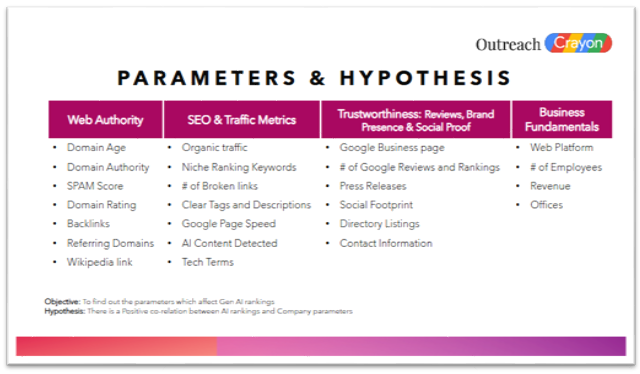
Analyzing Data for AI-Driven Insights
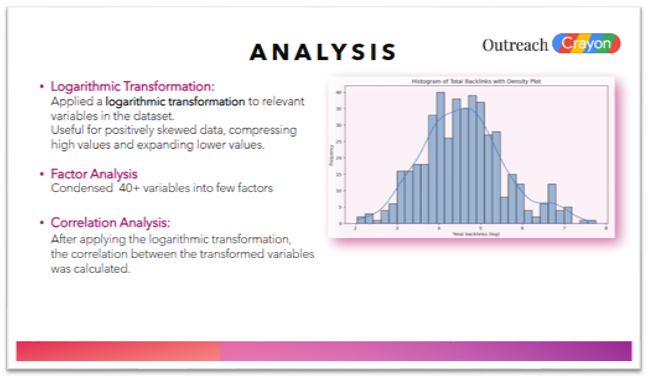
When evaluating B2B companies’ search performance, we encountered difficulties in dealing with skewed data, which is usually present in SEO-related metrics, such as website traffic or domain authority.
These variables are usually characterized by a few very large values that can severely skew the results. To address this, we transformed the main variables in our dataset by applying the logarithm transformation to stabilize the variance.
Logarithmic Transformation:
One notable use of this technique was in addressing positively skewed data, as is normally seen in web traffic and domain authority scores.
Outcome:
The logarithmic transformation successfully decreased the skewness of data and, therefore, enhanced the quality of the data before passing through the generative AI algorithm for ranking.
Correlation Analysis:
After performing the logarithm transformation, we calculated the correlation between transformed variables. This made it possible to get more insights into the deeper relationships between the SEO performance metrics and the AI-generated search ranking.
Key Findings

From the above analysis of AI-generated search rankings for B2B companies, we identified that the correlation between different SEO metrics and AI rankings was not constant.
Here’s a breakdown of those findings:
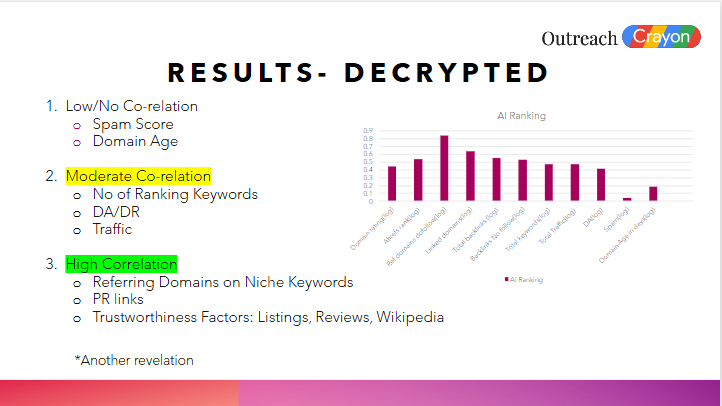
Low/No Correlation
- Spam Score: There is little to no correlation, implying that AI search engines are not penalizing sites with high spam scores; rather, they are focusing on better-quality signals.
- Domain Age: The results also reveal that domain age has a very low or no relationship with AI rankings, meaning that newly registered domains are not at a significant disadvantage compared to the older ones.
Moderate Correlation
- Number of Ranking Keywords: A moderate correlation was found, suggesting that a wider range of keywords increases visibility, though it’s not the only factor.
- Domain Rating (DR): Domain rating shows a moderate correlation with AI rankings. While DR remains important, AI search engines weigh other factors like content quality and relevance more heavily when determining rank.
- Traffic: There is a moderate correlation, implying that while higher traffic can improve rankings, it is not the primary driver.
High Correlation
- Referring Domains on Niche Keywords: Referring domains show a high correlation with AI rankings, meaning that links from authoritative and relevant websites within a specific industry or niche significantly boost AI search rankings.
- PR Links: PR links have a high correlation with better AI search rankings that provide credibility and enhance visibility and trustworthiness in AI-driven searches.
- Trustworthiness Factors (Listings, Reviews, Wikipedia): Trustworthiness indicators show a high correlation with AI rankings. These signals help AI determine the reliability and authority of a business, making them key drivers of better search performance.
Effective Ways to Outsmart AI Algorithm
1. Enhance Brand Trustworthiness
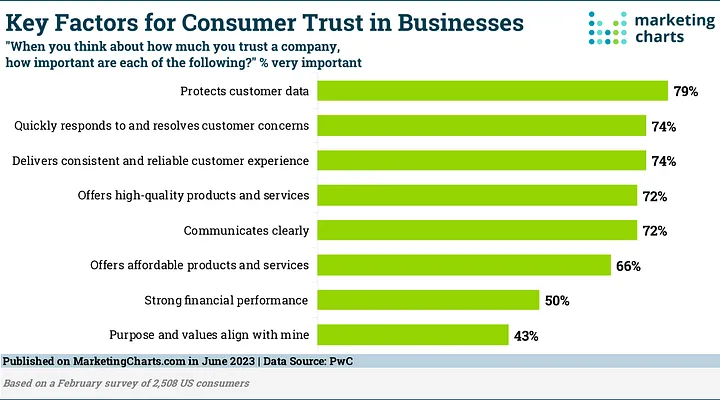 marketingcharts.com
marketingcharts.com
AI search engines prioritize brands that appear credible and trustworthy. Start by securing PR links by ranking in top industry listicles, as mentions in respected media outlets signal authority.
Additionally, client reviews are key; positive feedback across platforms like Google Reviews or industry-specific sites can greatly enhance your brand’s reliability.
Social proof, such as consistent listings in directories and active engagement across social media, further bolsters your brand’s trust factor.
2. Establish Authority in Your Micro-Niche
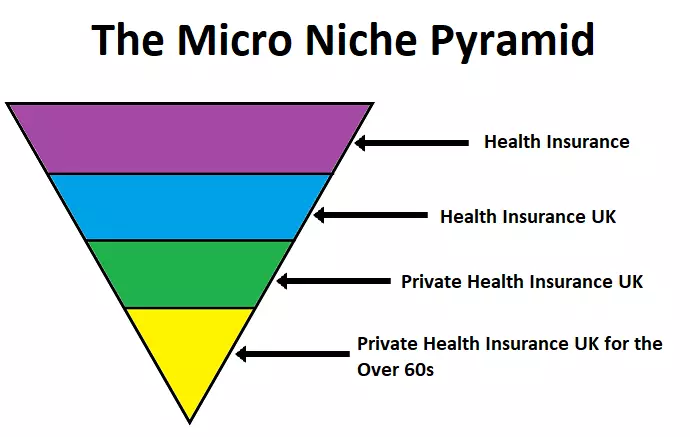
AI algorithms favor content from authoritative voices within a specific niche. To establish your brand as a leader, ensure that the content on your website is created or reviewed by subject matter experts, adhering to EEAT (Expertise, Authoritativeness, Trustworthiness) guidelines.
3. Leverage Power Backlinks
Backlinks from high-authority sites play a crucial role in ranking well in AI-driven searches. These power backlinks act as endorsements for your content, signaling that it’s trustworthy and valuable.
Emerging Technologies and Their Potential Impact
1. Multimodal Search Capabilities
 cloud.google.com
cloud.google.com
According to recent data, the global multimodal AI market size was estimated at USD 1.34 billion in 2023 and is projected to grow at a compound annual growth rate (CAGR) of 35.8% from 2024 to 2030, highlighting the rapid adoption of these technologies.
2. Hyper-Personalization Through AI
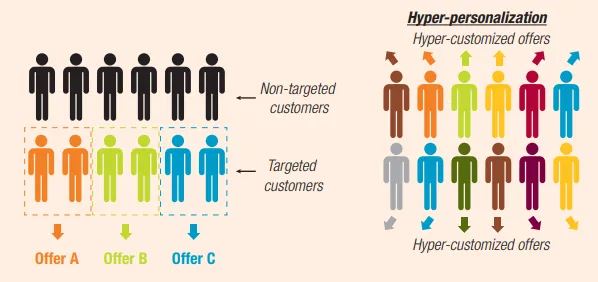
medium.com
A 2023 study by Accenture found that 91% of customers are more likely to purchase from brands that provide relevant offers and recommendations.
3. AI-Driven Voice Search Dominance
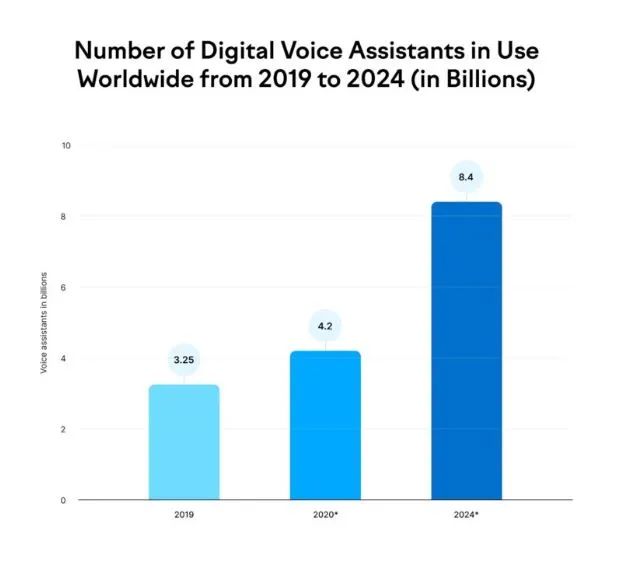 semrush.com
semrush.com
A new report projects that by 2024, consumers will be interacting with voice assistants on more than 8.4 billion devices, surpassing the global population.
Predictions For the Evolution of B2B Search Behavior
1. Shift to Intent-Based Optimization
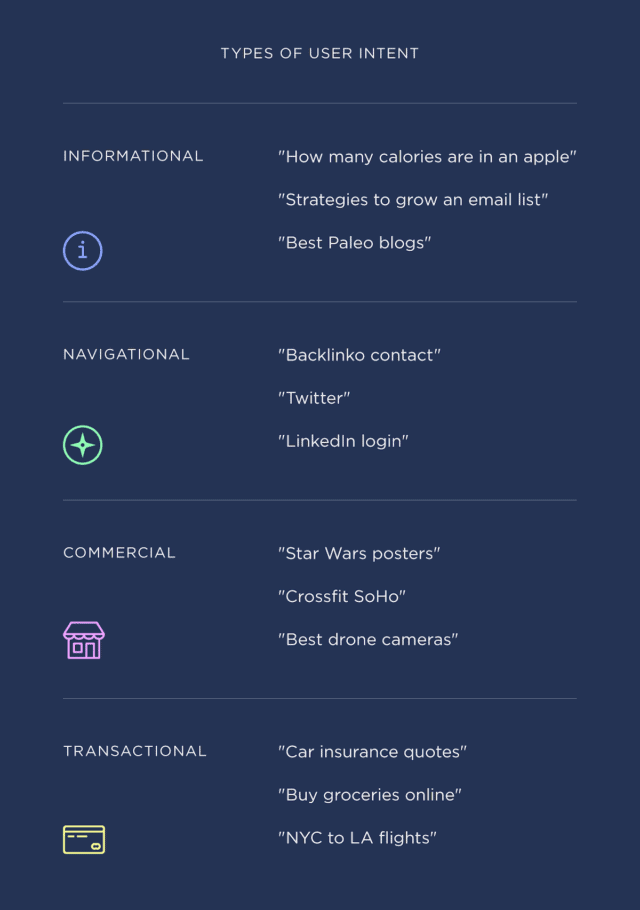
backlinko.com
AI search engines are more inclined toward intent-based search rather than using keywords. Recent research shows that over 50% of the searches will be handled by AI in the near future, the key concern being user demand fulfillment.
2. Rise of Conversational Commerce
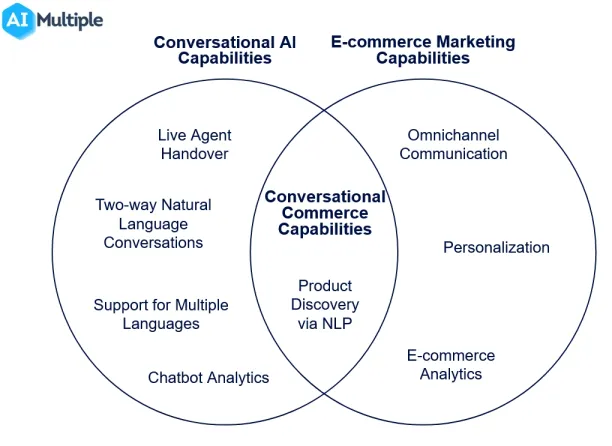
research.aimultiple.com
AI-driven platforms are accelerating conversational commerce, where business inquiries and even purchases can happen via real-time dialogues with AI systems. By 2025, conversational AI is predicted to handle 80% of all online customer interactions (according to Gartner).
3. Democratization of AI-Powered Tools
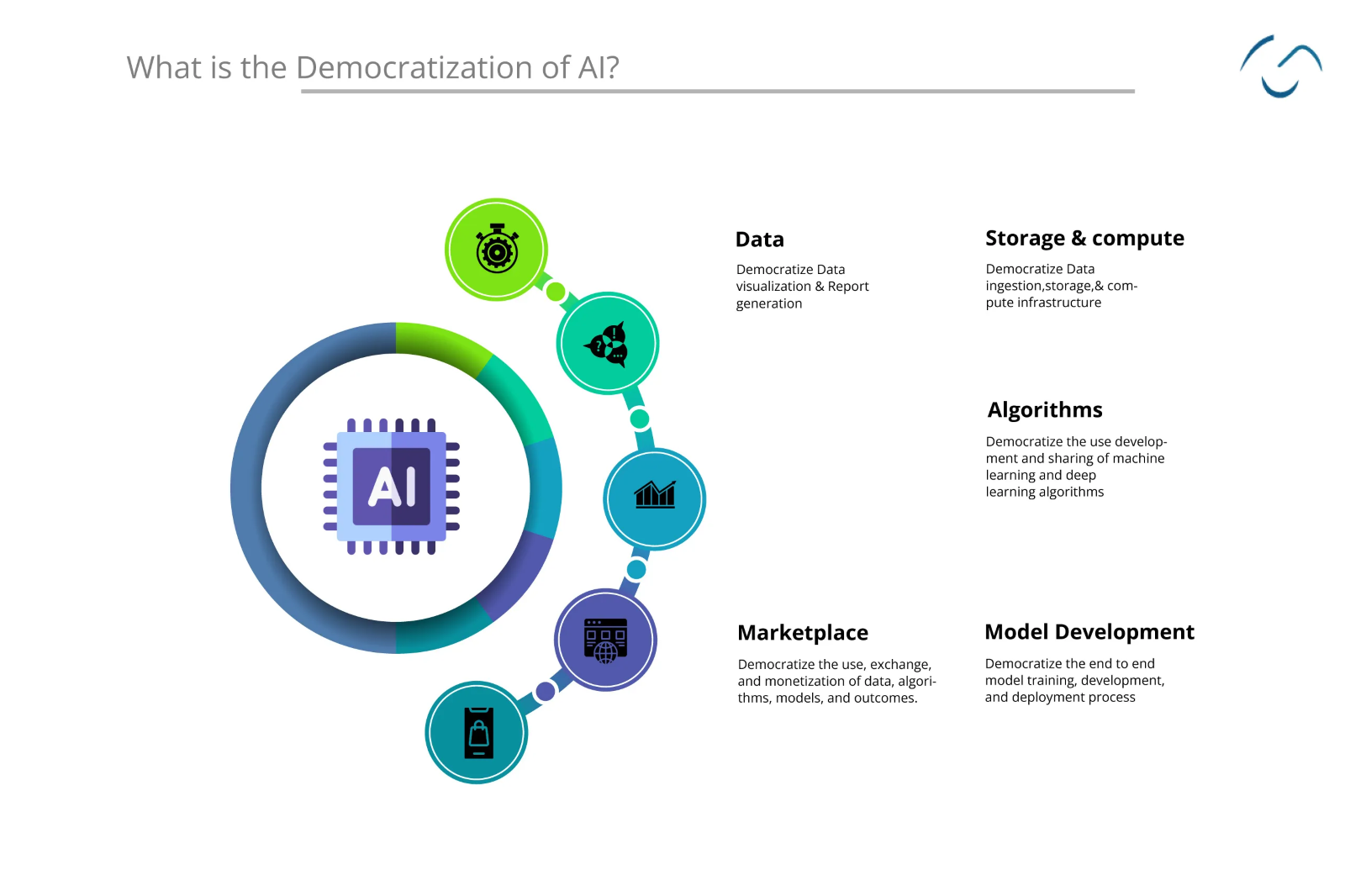 ongraphtech.medium.com
ongraphtech.medium.com
The democratization of AI tools is transforming the competitive landscape, allowing businesses of all sizes to leverage advanced technologies. McKinsey highlights the tangible impact of AI, noting that 41% of respondents in supply chain management reported cost reductions between 10% and 19% after implementing AI.
Conclusion
Generative AI is shaping the future of B2B marketing, and those who embrace change will top the industry charts. It is not just a trend but a necessity to change the focus from traditional SEO to GEO-based optimization.
The battle for AI search rankings has started already – those who implement these tactics will not only withstand but prosper in this smart and progressive digital world.
About the Author:

Vibhav Gaur, Chief Business Officer at Ebizon and Co-founder of Outreach Crayon, is a pioneer in digital marketing and AI-driven search strategies. With over two decades of experience, he leads a team of 300+ experts, revolutionizing online visibility for businesses worldwide.
At Outreach Crayon, a leading link building and content marketing agency, Vibhav has spearheaded the transition from traditional SEO to Generative Engine Optimization (GEO). His groundbreaking research into AI-generated rankings for B2B companies has positioned him as a key authority in this emerging field.
In this seminar, Vibhav shares exclusive insights from his team’s extensive research, offering a unique roadmap for businesses to dominate generative AI search rankings in the evolving digital landscape.
